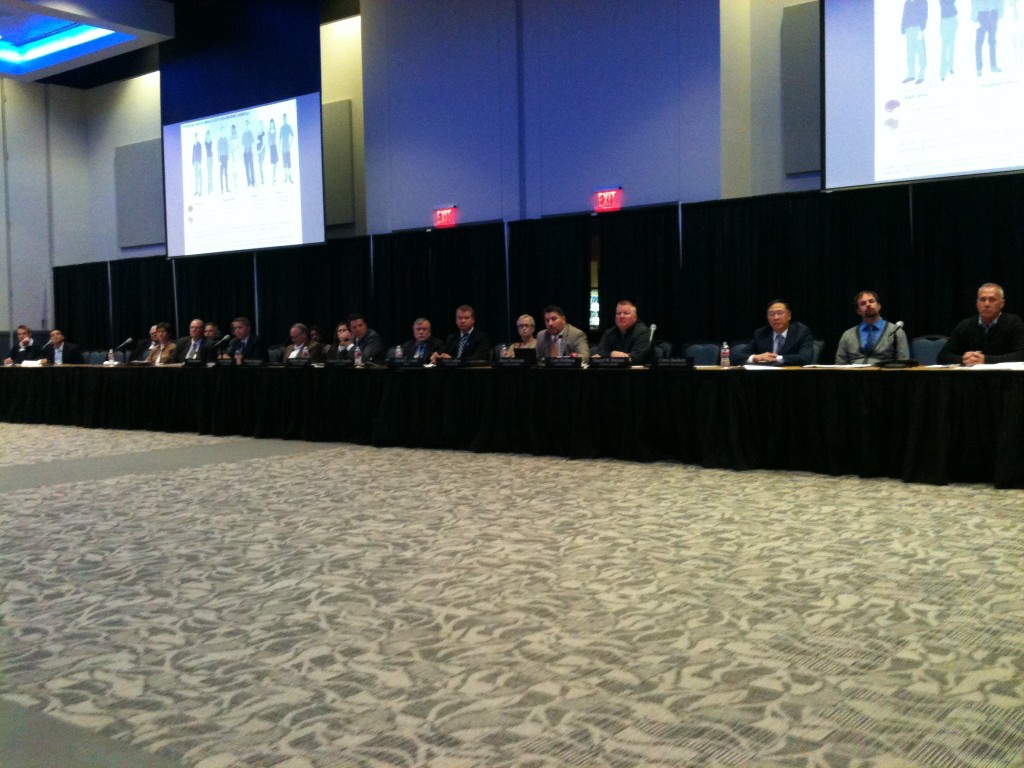Building Momentum in Mansfield
 Good things come in threes. Lance Irwin, Erick Orsak, and Tamera Bounds proved that again on Wednesday night when they led the Mansfield Gas Well Awareness contingent during the Mansfield City Council's "work session" on rewriting the city's gas drilling ordinance.
Good things come in threes. Lance Irwin, Erick Orsak, and Tamera Bounds proved that again on Wednesday night when they led the Mansfield Gas Well Awareness contingent during the Mansfield City Council's "work session" on rewriting the city's gas drilling ordinance.
Combined, they projected just the right mix of competence, skepticism, and experience to combat the "Don't worry, be happy" approach of the Railroad Commission and Texas Commission on Environmental Quality presentations that preceded them in the agenda.
(By the way did you know, that according to Austin, the average response time of a TCEQ inspector responding to a complaint was only 5 hours? Downwinders at Risk is willing to pay $100 to the charity of the inspectors' choice if anyone out there has ever gotten a response that quickly. After almost 30 years of dealing with state environmental agencies, we can't recall a single instance where it took less than a day for an inspector to show up, even when the situation was "urgent.")
By putting the three residents in the same horseshoe as industry, state agencies, and itself, the Council elevated the status of the resident's group beyond anything it had enjoyed in previous rounds of jousting over drilling. Whether that leads to the kinds of substantial changes to the city's drilling ordinance the group is pursuing remains to be seen.
What was obvious after the formal presentations ended and a more informal question and answer period followed was the large disparity in monitoring and self-regulation within the industry. There were at least 10 or 12 gas operators sitting at the table during the event. Conspicuous by its absence was Eagleridge, the source of many complaints in Mansfield and of course, the company that ignited the Denton fracking vote controversy.
But Eagleridge's Chief Operating Officer Mark Grawe was present, in the back of the room, trying to keep a low profile. It didn't work. Let's just say when you get called on the carpet by Stephen Lindsey, the Mansfield Council member whose day job is the "Government Relations and Community Affairs Director" for gas industry giant Quicksilver, you know you're not going to have a good night. As the evening wore on, it was clear Eagleridge was being portrayed as the poor, white trash cousin of the more established players like XTO and Chesapeake. The company lacked the remote sensors, automatic cut-offs, and other kinds of precautions that the rest of the industry reps liked to brag about. By the end of a rigorous cross-examination of Grawe by the residents' group, there was an unacknowledged consensus that perhaps the floor for regulating existing wells needed to be raised in Mansfield so that moving target known as "industry best practices" was updated applied to all.
More ambiguous was the response to the residents' request for a 1500-foot setback to replace the current 600 feet requirement – with a variance that can decreases that distance to 300 feet. Some industry representatives and council members want to frame the problem in terms of incidents and accidents that can be fixed with better equipment, rather than systematic changes that require separating people from heavy industrial activity, no matter how good the intentions are.
Also left hanging was how to better regulate polluting compressors. The city's lawyers, who've written protective ordinances for Dish and Southlake, was more circumscribed with their Mansfield employers. Cities can't regulate pipelines and mid-stream compressors for "safety standards," already addressed by the Railroad Commission they said. Left unsaid was that cities can and have regulated compressors for noise and "odors," otherwise known as toxic chemical exposures.
Bounds presented the city council with what she called a model ordinance that combined the best, most protective aspects of drilling regulations from DISH, Southlake, Dallas, Denton, Arlington and even Fort Worth. Saying these were legal requirements that hadn't been challenged by industry and so were available for adoption by the city, Bounds put the council on the spot by saying Mansfield needed to protect its citizens at least as much as these other municipalities and had no legal excuse for not doing so. Mayor David Cook took note of the work she'd done in compiling the new ordinance and said the city would perform its own side-by-side comparison and come back in January to continue the discussion.
Overall, the mood of the evening was cautious but positive. It was hard not to be impressed by the residents' knowledge and expertise, and everyone was civil in public. Afterwards, however, one of the first things Bounds heard was an industry operator telling her there was no way he was going to accept a 1500-foot setback. There is still plenty of work to be done. But it was a step in the right direction. And there are no big changes without incremental changes first.
It helped that the media were out in force, trying to identify the next fracking hotspot after Denton. There was a row of TV cameras and local and national print reporters showed up to take notes. Channel 8 had the best coverage of the evening, and if you can get past the paywall, here's the Star-Telegram's take.
As has been noted before, Mansfield is no Denton. It's not even Southlake or Flower Mound. It resembles Ft. Worth more than it does Dallas in terms of politics and attitudes toward the gas industry by the Powers That Be. It has more wells per capita than just about any place else in the Shale. But those are all reasons that make it worth fighting the good fight there. If residents can make their case effectively and change their situation in Mansfield, then there really is hope for everyplace else in the Barnett. Stay tuned.
